| Srl | Item |
| 1 |
ID:
118175
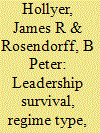

|
|
|
|
|
| Publication |
2012.
|
| Summary/Abstract |
Preferential trade agreements (PTAs) limit member-states' trade policy discretion; consequently, policy uncertainty is mitigated. Reductions in policy uncertainty stemming from accession to a PTA improve the resource allocation decisions of the voters and reduce deadweight losses from the need to self-insure against policy uncertainty. The resultant increase in efficiency improves an incumbent government's-particularly a democratic government's-chance of surviving in office. We test this prediction using survival analysis, adjusting for potential selection biases using propensity score matching. We find robust support for the proposition that governments that sign PTAs survive longer in office than observationally similar governments that do not sign. In addition, we find that this effect is stronger in democracies than in autocracies.
|
|
|
|
|
|
|
|
|
|
|
|
|
|
|
|
| 2 |
ID:
061482
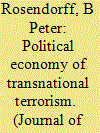

|
|
|
| 3 |
ID:
057595
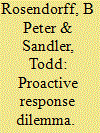

|
|
|
| 4 |
ID:
067492
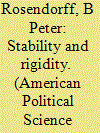

|
|
|
| 5 |
ID:
100956
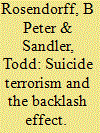

|
|
|
|
|
| Publication |
2010.
|
| Summary/Abstract |
This paper presents a game-theoretic model of suicide terrorism containing three agents: the terrorist leader; a targeted government; and potential terrorist supporters. Supporters join the terrorist group if they gain more from their participation than from their economic opportunities. Preemptive measures by the government can result in a backlash that encourages recruitment through new grievances. Suicide attacks can also lead to recruitment. Increases in preemption costs and/or economic opportunities can reduce the overall level of terrorism, while increasing the proportion of suicide to normal attacks. An increase in the effect of preemption on recruitment, or the propaganda effect of suicide bombings has the opposite effect of increasing normal and suicide attacks, but decreasing the proportion of suicide to normal attacks in the terrorist organization's strategy profile.
|
|
|
|
|
|
|
|
|
|
|
|
|
|
|
|
| 6 |
ID:
143145
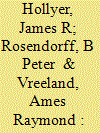

|
|
|
|
|
| Summary/Abstract |
The collapse of autocratic regimes is often brought about through large-scale mobilization and collective action by elements of the populace. The willingness of any given member of the public to participate in actions such as strikes and protests is contingent upon her beliefs about others’ willingness to similarly mobilize. In this article, we examine the effect of a specific form of transparency—the disclosure of economic data by the government—on citizen belief formation, and consequently on collective mobilization. We present a theoretical model in which, under autocratic rule, transparency increases the frequency of protests, and increases the extent to which protest is correlated with incumbent performance. We find empirical support for these claims. Transparency destabilizes autocracies via mass protest.
|
|
|
|
|
|
|
|
|
|
|
|
|
|
|
|